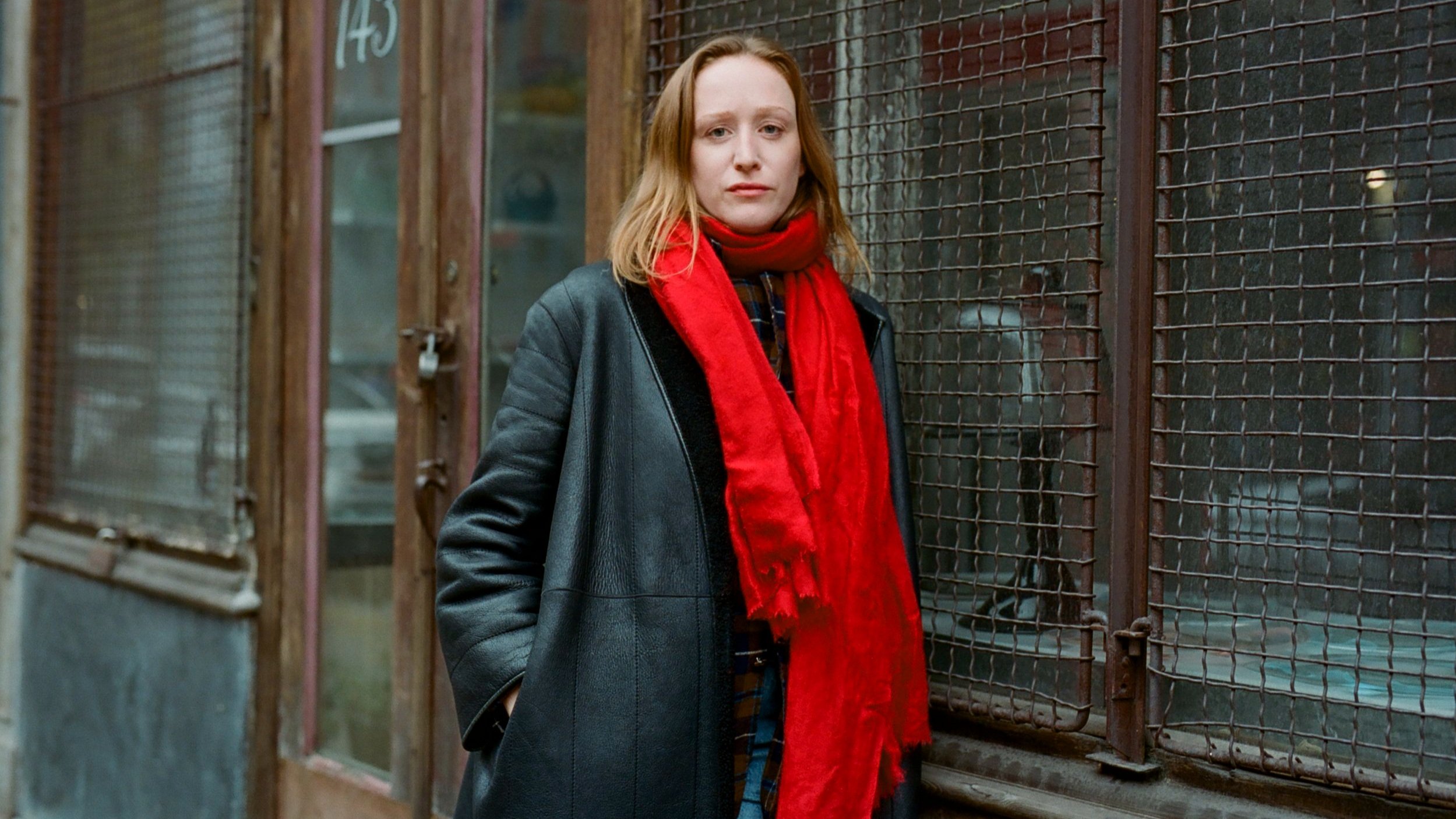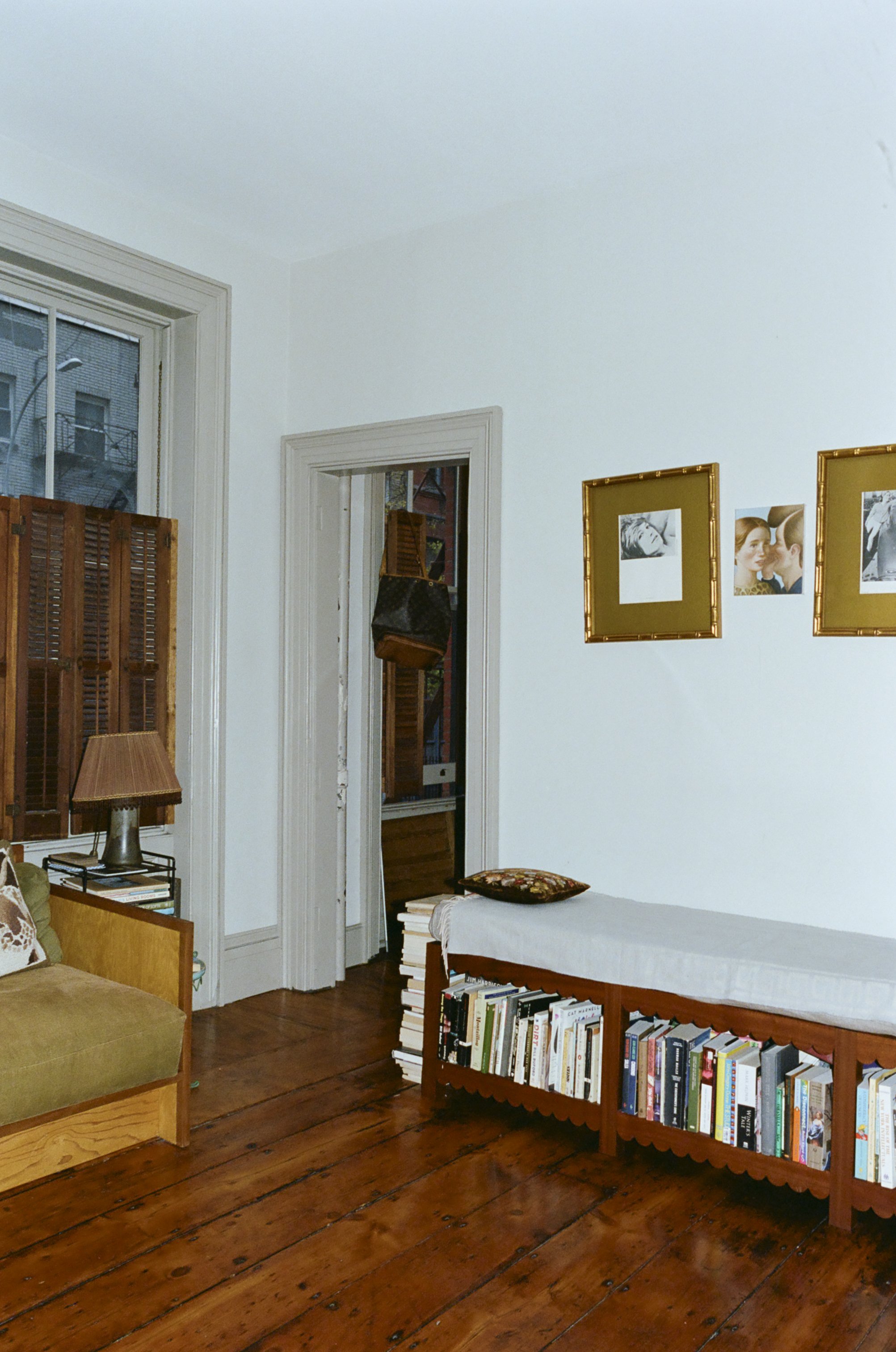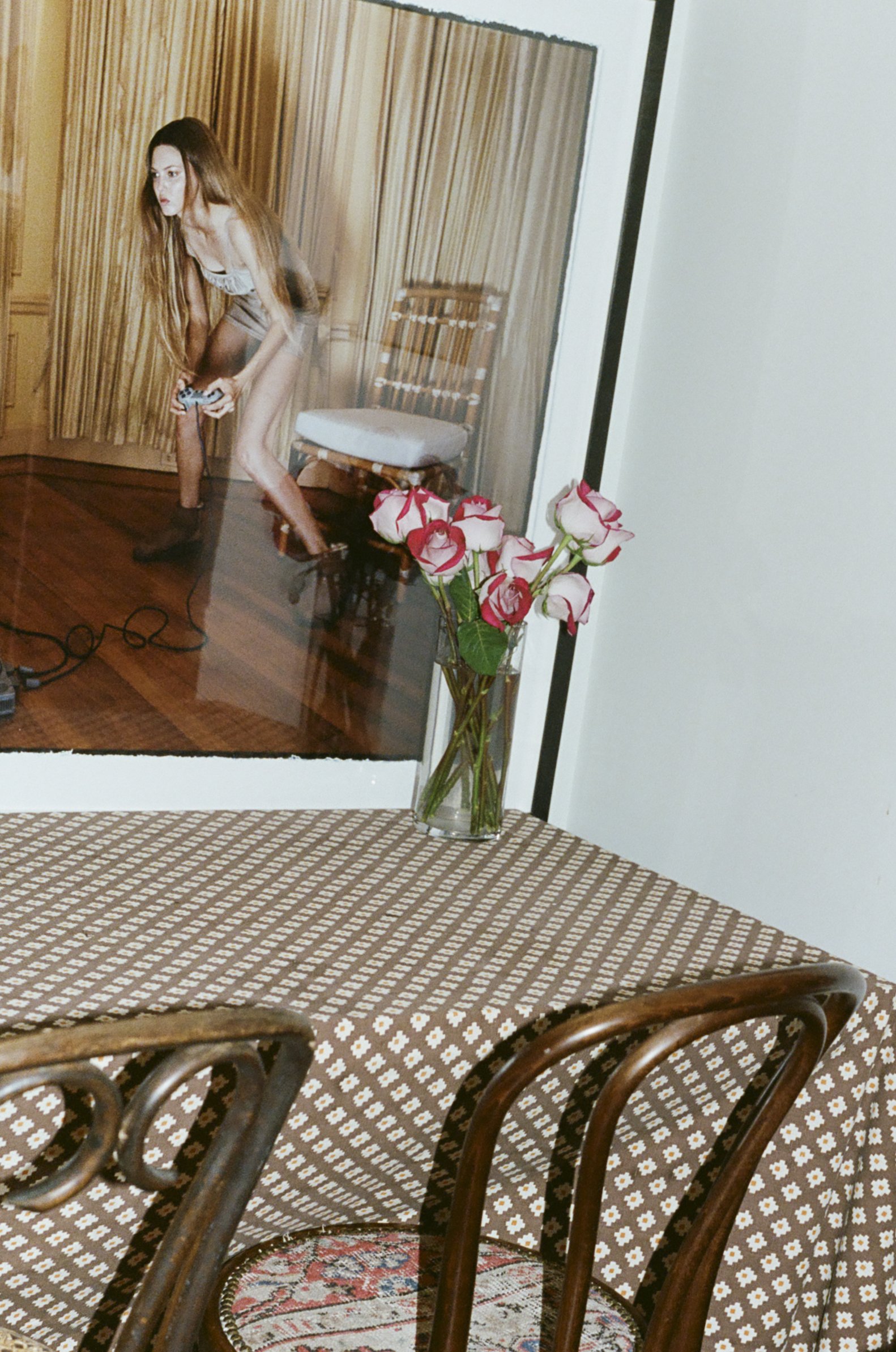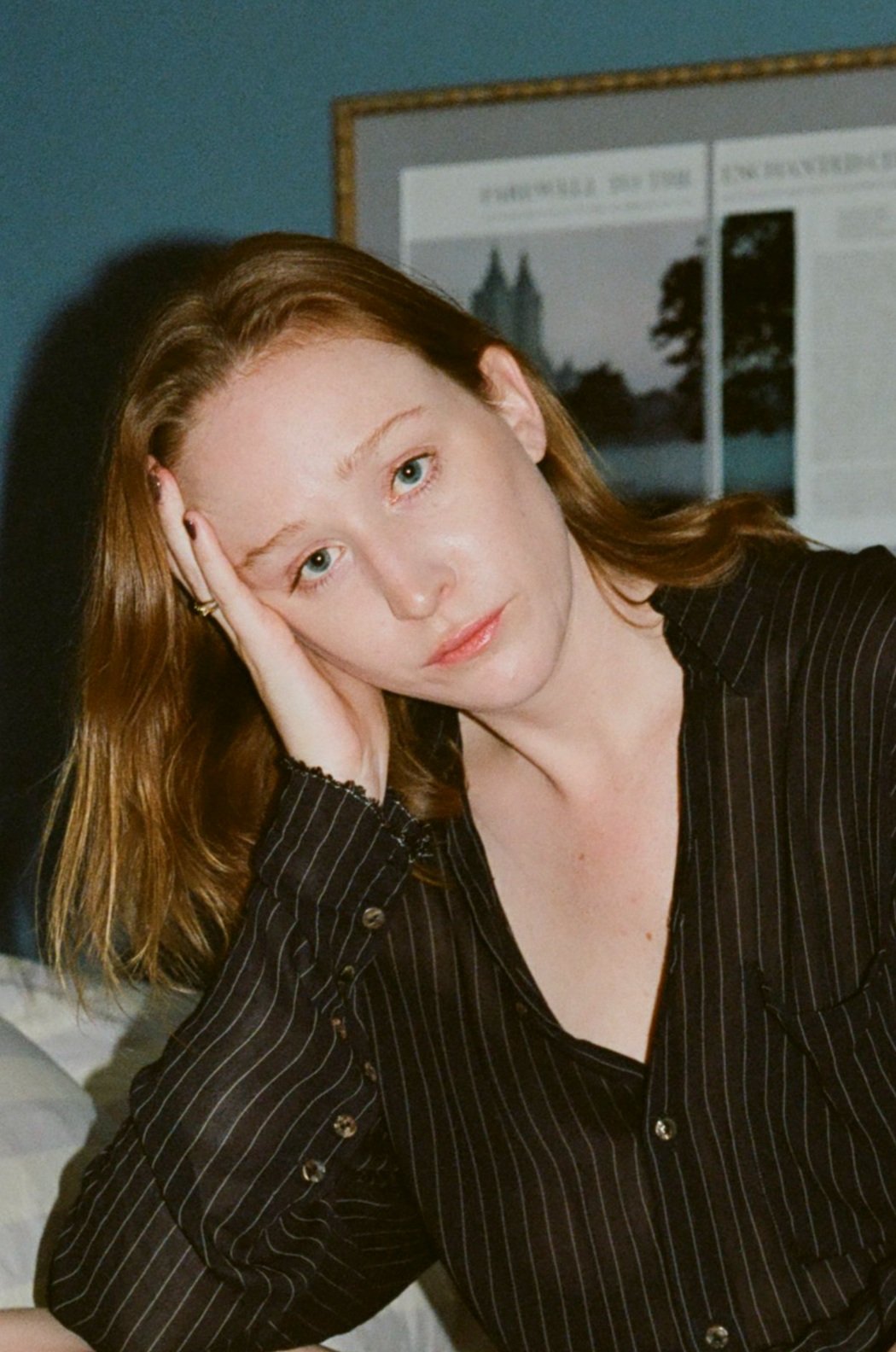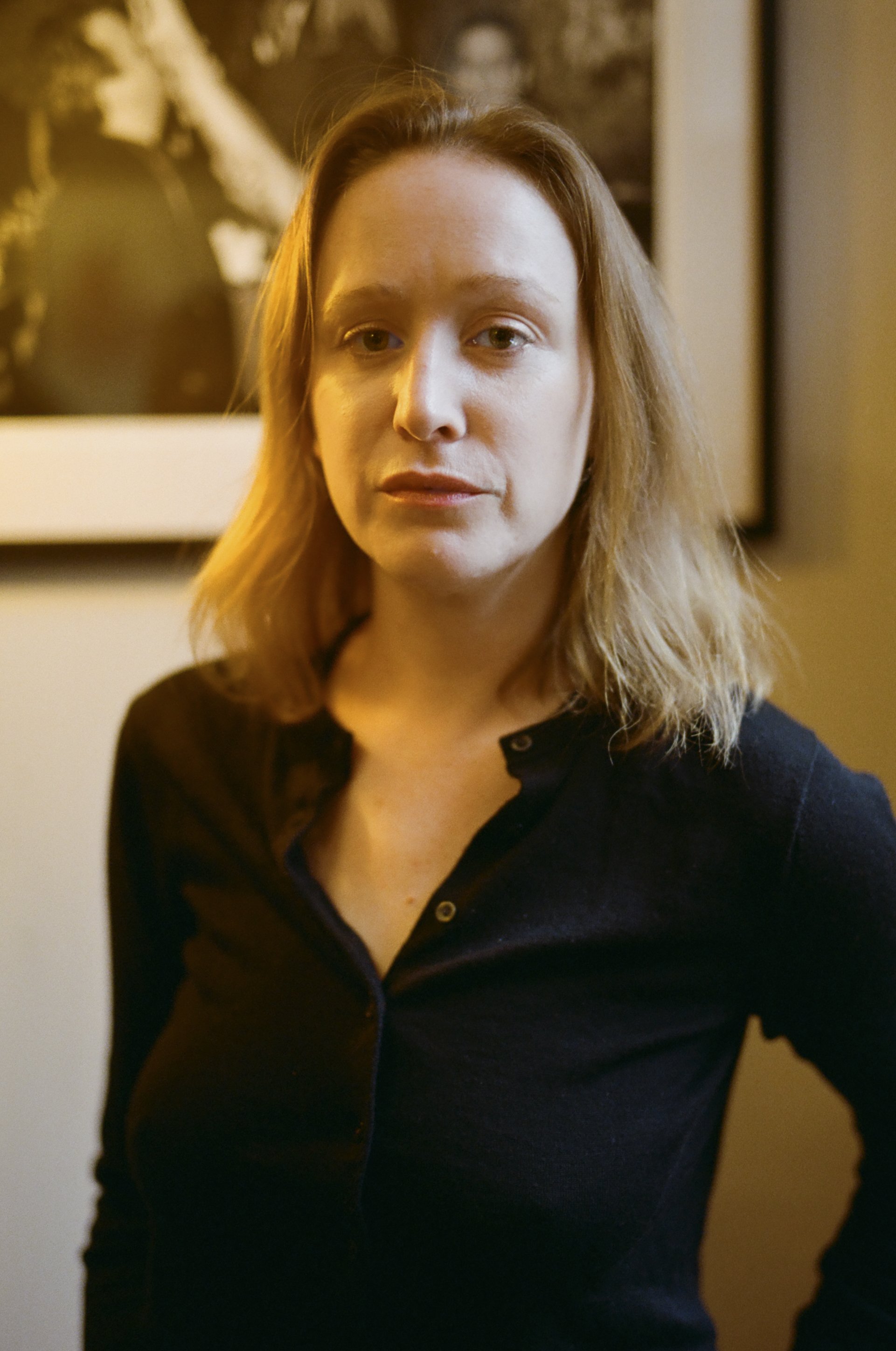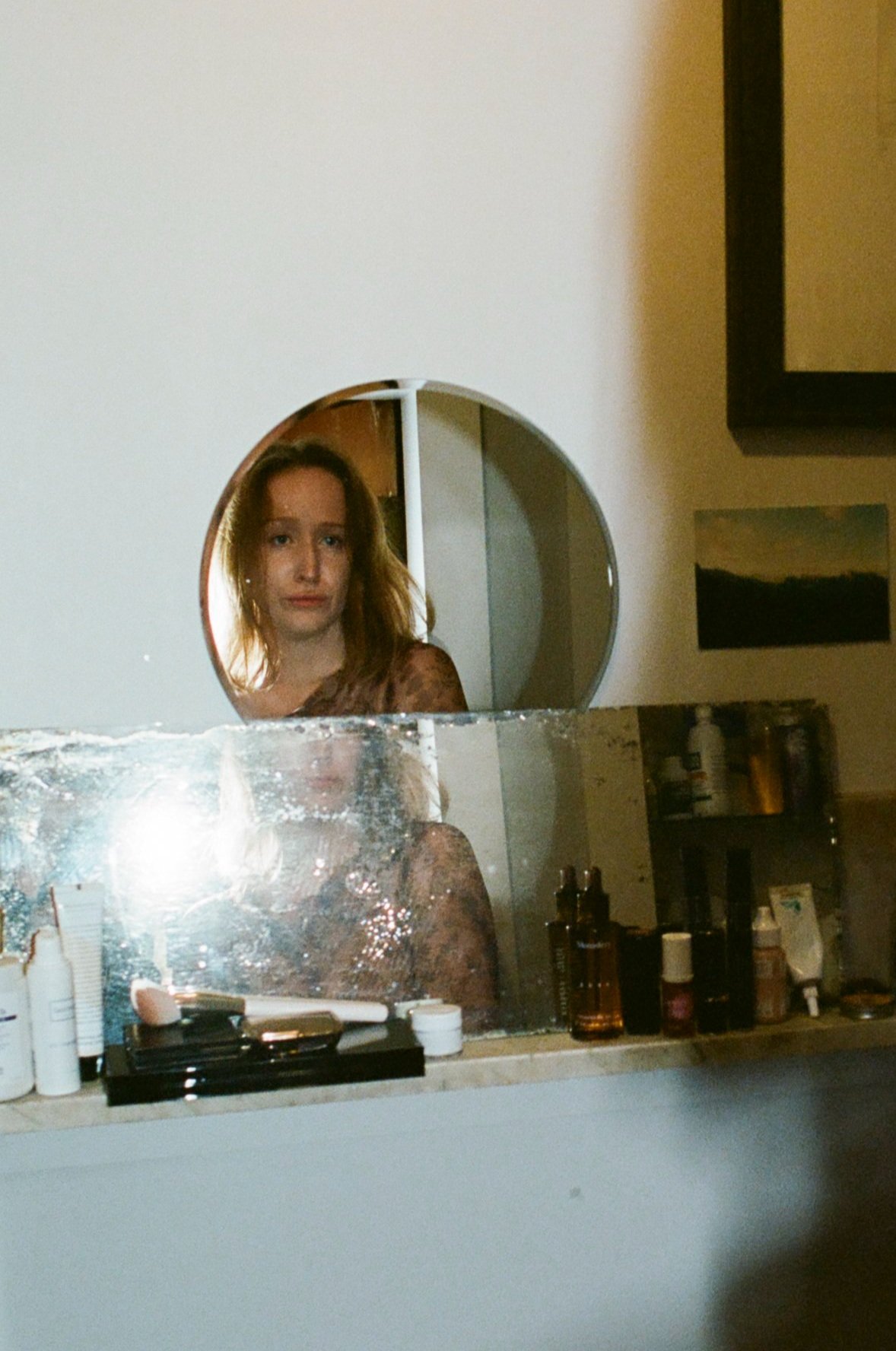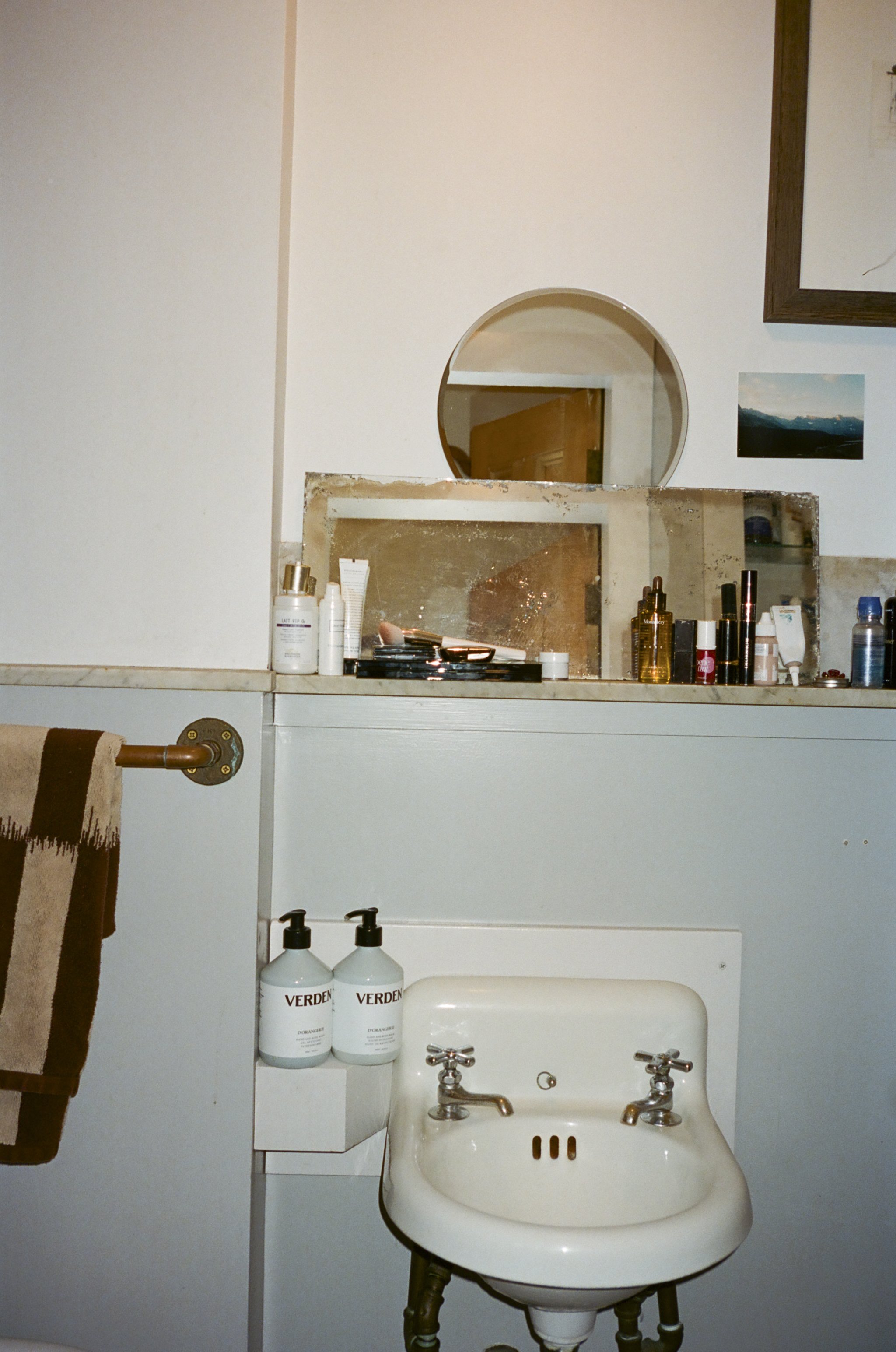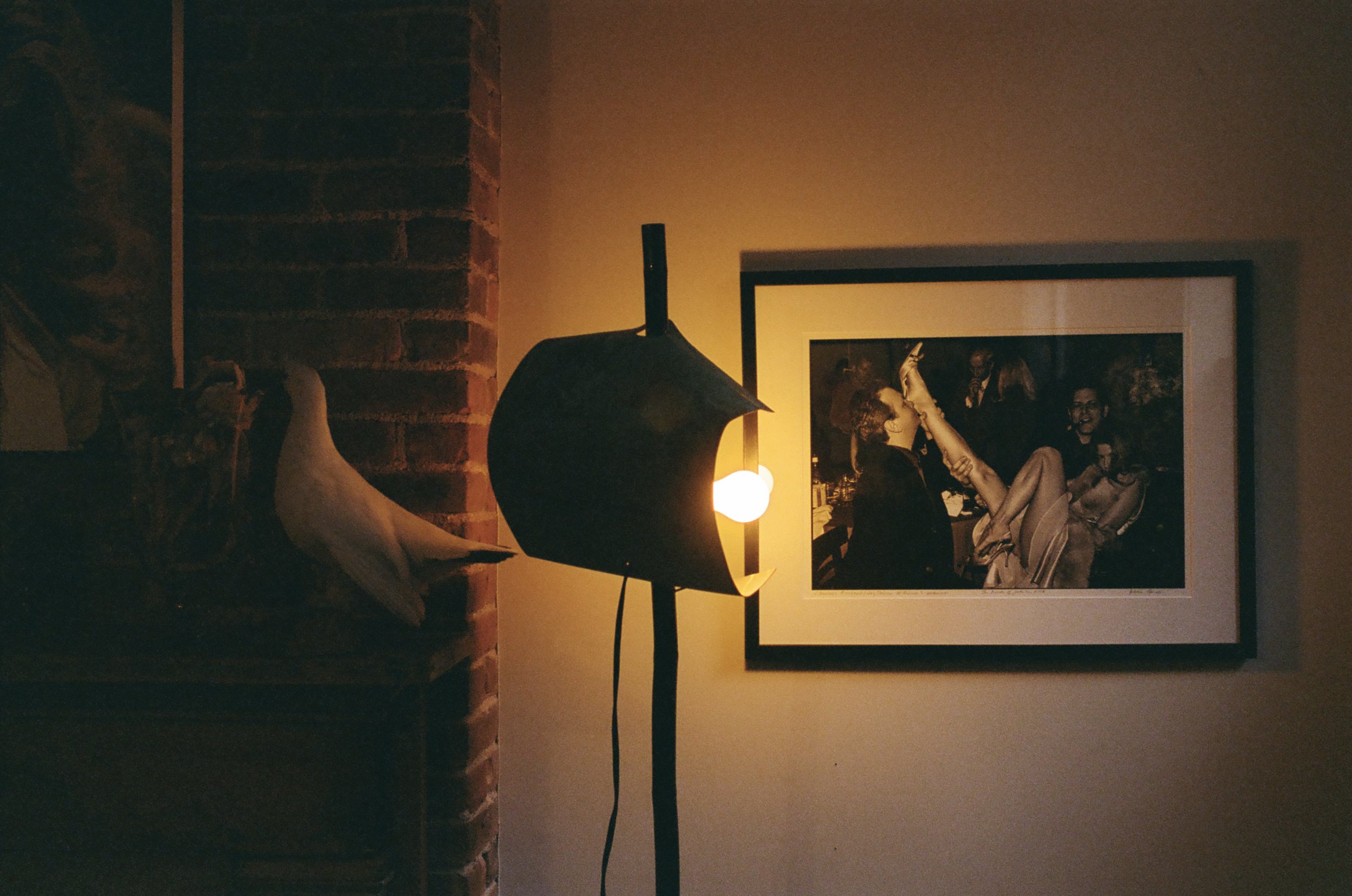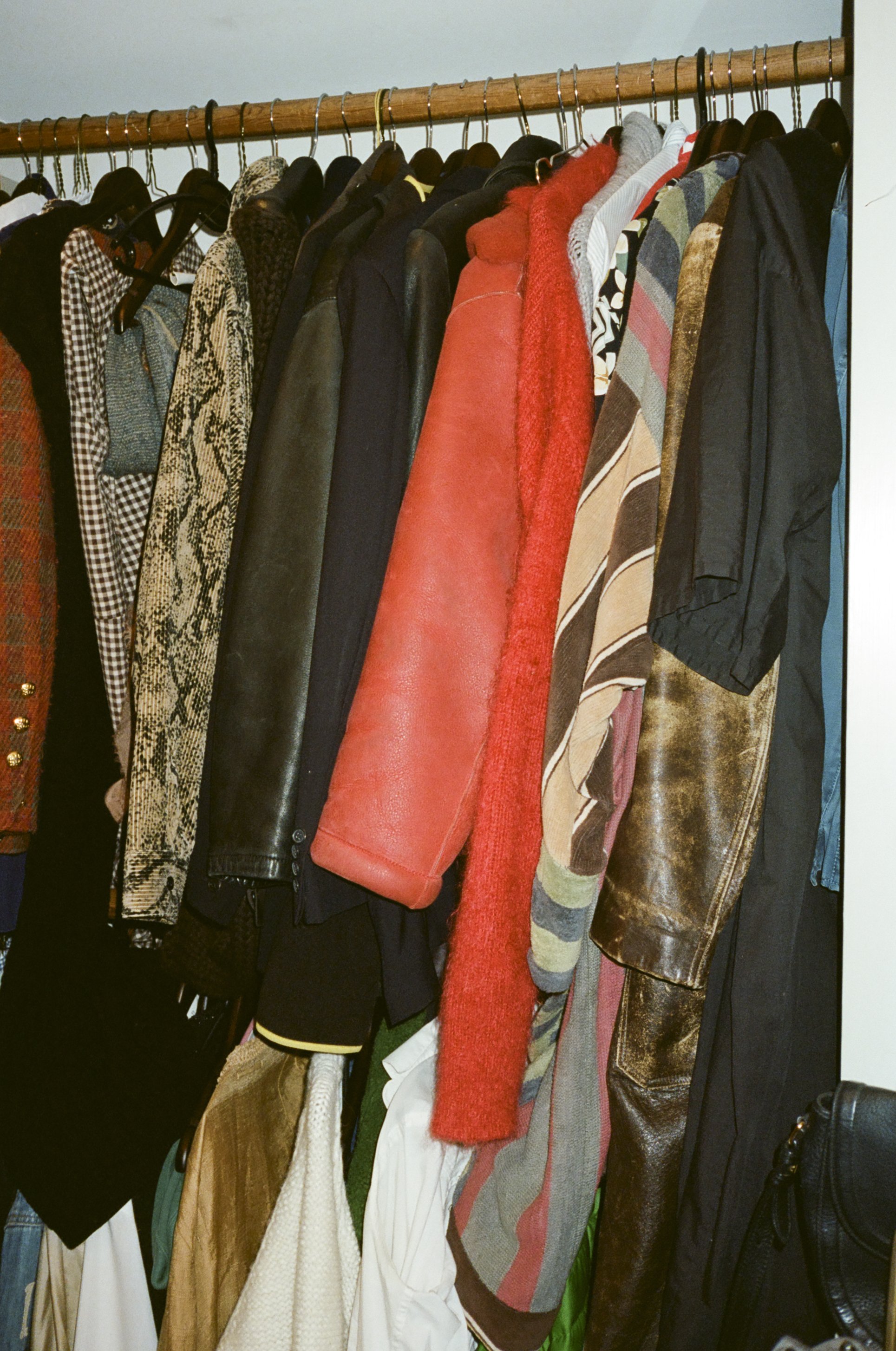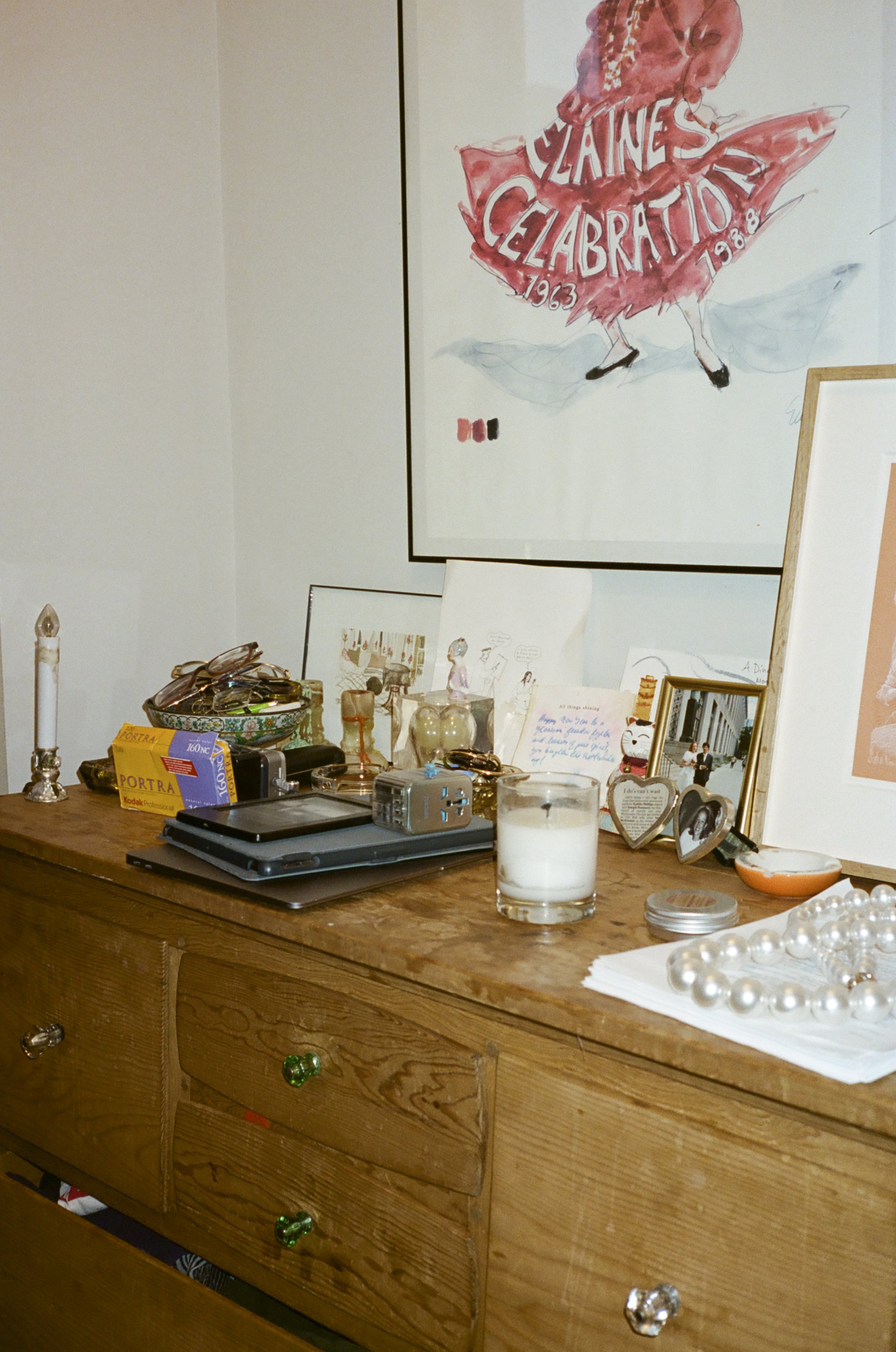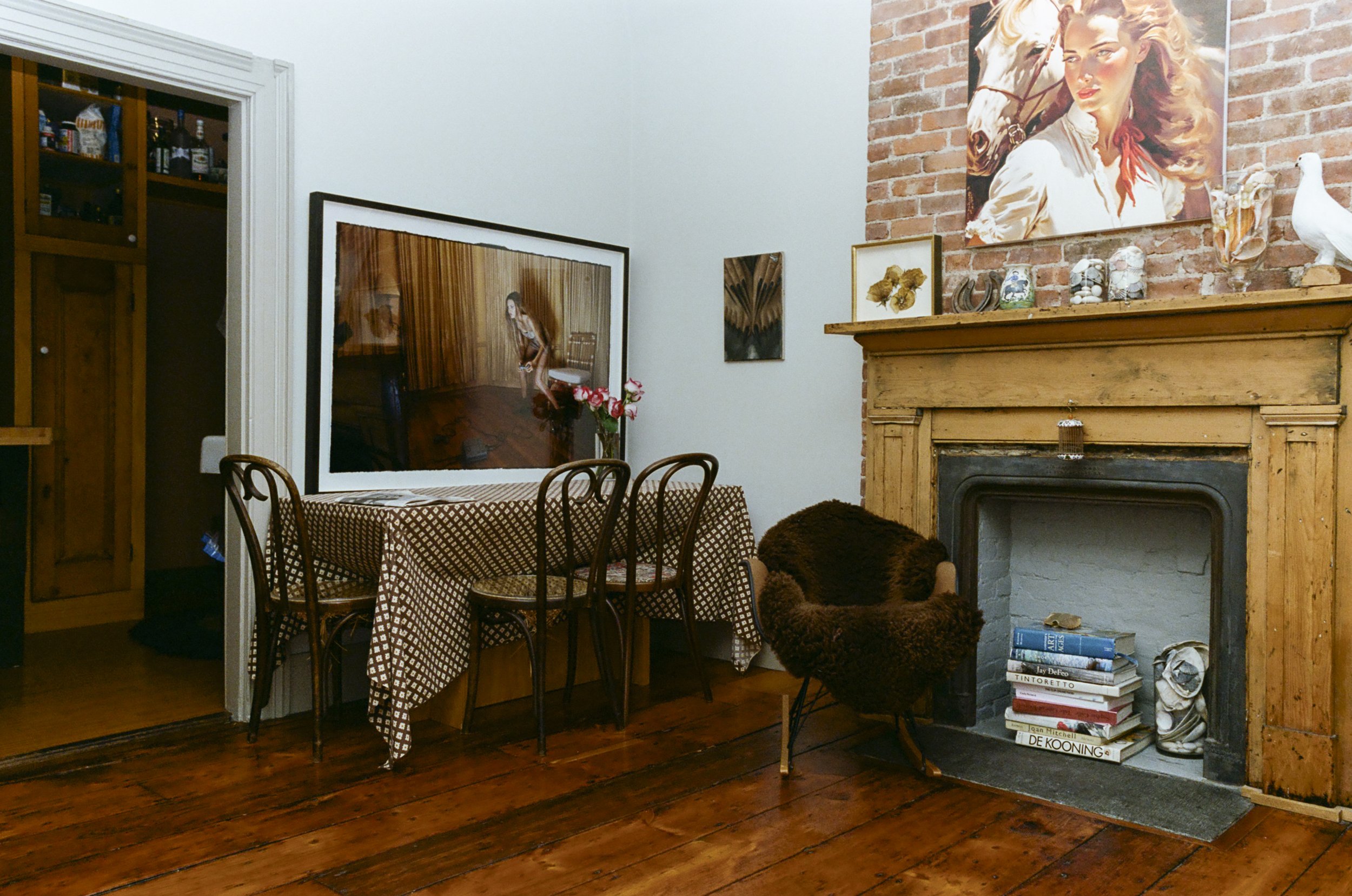It’s no secret that publicist Kaitlin Phillips can often be found at Lucien on the Lower East Side, but these days she’s splitting her time between Manhattan and Marseille. In New York, she’ll meet you for a drink and might even help you get a job. In Marseille, she’s reading on the beach and eating three meals a day, prepared by her husband. She’s even writing again. We were excited to talk to her about watching the Olympics on a rented television set, finding a job on Facebook, making rent, and more.
♫ listen to katilin’s playlist | ⌨ kaitlin’s last google search
on her morning routine
Joe, my husband, dictates a lot of the morning stuff. He's better at mornings. The first thing that happens is he gets out of bed and opens the shutters, and all of a sudden, there's light in the room. Then he brings me coffee, and he’ll often go out and get us croissants and bring me one in bed. Then we get started. The first thing I do is decide which time zone I'm going to work in. I either work on France time, New York time, or across both. If I am working New York time, I don't start until three, so in the summer, I will go to the beach in the morning and read a book or pursue hobbies, like writing or making money outside of publicity. France is becoming an opportunity for me to become a writer again. I just didn’t have that time in New York, and the blogging I've been doing and the gift guides have been written while I was in France.
on living between New york and Marseille
I’m in Marseille because my husband doesn’t want to live in New York. If that wasn’t the case we would have stayed in New York. I never imagined leaving New York or living any other type of way. But once I met Joe, I was like, “Oh, wow, I could live a much better life that just is more diverse, more interesting.” He lives really well. He does all of our cooking. For many years I used to just eat one meal a day — I would go out for dinner. And now I eat all three meals.
In France, I don't have as many friends so I’m working on myself here. I get to hang out with my husband and enjoy nature. It's a reprieve for me. It’s a different kind of fun. In New York, I go out every night. It’s not as relaxed. I’ll clock out at five because I have to see a journalist, and then anytime I meet a journalist, I'll double book them and see a friend after. If I'm already drinking, I might as well have real fun.
““The truth is, I never had to be that ambitious. My writing career very much came to me. I never felt the passion for being a writer. I think I would have done anything. If someone was to offer me a banking job, I’d be a banker.””
on learning to read and growing up without a tv
My dad was vehement that we all read before we entered kindergarten. We weren't allowed to go to bed until you finished a book out loud. My grandma told me this sort of disturbing story about me sobbing because I didn't want to read a book, and my dad having no sympathy because my brother was very smart and took to reading naturally. And I remember the only game I was allowed to play was Hooked on Phonics. He was really pushy about it. Then once I got over the hump, he was right. I was obsessed.
We grew up without a television. My dad would rent us a TV for the Olympics. He's very patriotic. My parents bought a TV set sometime late in grade school, maybe junior high. They refused to get channels, but they got us a VHS. Our movie rental store wasn't a Blockbuster. It was some family store. You could rent six videos at a time, and so all weekend long I would watch video after video after video after video. I think my dad had a lot of ideas about childrearing.
on going away to school
I went to Emma Willard, which is a third-tier all-girls school in upstate New York. A wonderful school. I thrived. It was probably the best experience of my life. It was strict, you had study hall every night from 7:30 pm to 9:30 pm, and the internet would shut off across campus. I went because I didn't really have friends, and I'd read books about boarding school. And you can get a full ride when you're from a really rural place. My parents said I could apply and I don't think they ever thought anything would come of it.
Then I went to Barnard. Leaving a really small town and going to boarding school was something no one else did. I met people with money for the first time. You meet kids with real self-confidence, and you maybe emulate it a little. I didn't want to have to go back to Montana and be like, “I failed.” So, at every point, I was like, I have to make this work. When I was applying to [college], I only applied to one because I was terrified that if I got more money somewhere else, my parents wouldn't let me go to the school I wanted to go to. So, I lied and just applied to one.
““We gossip about people we know. And then we talk shop. I’ll listen to how some editor ruined your piece or why the publicist for your book is bad. Any sort of talking shop, I could do forever. My husband is like, ‘Can you guys talk about ideas?’ I have a lot of friends who talk about ideas. They just don’t talk about them with me.””
on getting started as a writer
I wasn't one of those people who's like “I wrote a novel when I was six,” on construction paper or whatever. I never ever thought about being a writer. In college, I started out as a biology major, and then I was a waitress and then I met Mary Karr and she hired me to be her assistant. I never tell anyone they should write, it's such a bad profession, but she was like, “you should write.” She got me an internship at n+1, which I took because Columbia had internship grants, so it was a way for me to make money. I had no interest in it, but I had an interest in making money. I think I was one of the few people who saw internships as a money-making opportunity.
The truth is, writing was the thing that was easiest and the avenue where most of my opportunities were. I just wasn't offered anything else. I was just trying to make money so that I didn't have to leave New York. I definitely didn't call myself a writer for a long time. I was very wary of putting on airs.
I did New York Magazine party reporting. Michael Miller emailed me and asked me to write my first book review. And once I wrote one of those, Emily Cooke reached out and asked that I write a piece for Bookforum and once I wrote it, I got a lot of offers. She had me review Lena Dunham's book, which was very clever of her. I had a lot to say about it. The other key person was my friend Sarah Nicole Prickett. I think we met at a bar and didn't like each other. And then we met again and slowly became friends. She was extremely generous with me and with a lot of other people. She was writing for Artforum, and she was like, “You should write for Artforum.” She took me to drinks with David Velasco, who was an editor there. David was like, “I don't know about this. I don’t see it.” And so, Sarah was like, “what if we co-byline a piece?” which is not traditional at all. So, we wrote a piece together, and then David let me write a piece alone. Sarah really wasted her time so that I could do it. Once I'd done that, I started party reporting for Artforum. And that took off and people started to know who I was. n+1 I started publishing my diaries. Mark Krotov, an editor there, put my diaries online.
on new york and the friends you make there
I think it's too expensive. But I also think it's always been, for me, about friendship. To me, it's not about New York. It's where the best people in the world live. It's where the people who are most special to me live — if I could do anything in the world, I would get a drink with them. New York has this reputation of being a cold place and everyone being careerists, but the truth is, people are very generous. My entire career history in New York is specific people reaching out and helping me, and I always try to get people work if I hear about it.
““I have confidence, but I’m not delusional. I know what’s good and what’s not good, and I think my writing isn’t good enough to pursue full time. I think my publicity work is.””
on switching careers
I became a publicist at 26. At the time, I remember feeling so old to switch careers, but that’s such a ridiculous thing. I think is a trap that millennials fall into. You can switch careers anytime. I could switch careers right now.
People were kind of like “What happened?” And I was like, “What do you mean what happened?” My career had stalled, I wasn't advancing in any way. This idea of me as a writer was very built up in New York, but what did I have to show for it? I had three diary pieces in n+1 that people loved, but that's a total of 4,000 words I wrote. People kept asking me to write and I struggled to finish the pieces. They all seemed really upset I switched careers, but I was like, “What are you upset about? This is all fake.”
It was an ex-boyfriend of mine who was like, “You're so good at every single part of writing except for writing. Why don't you just get an adjacent career? It's brutal watching you do this, you're not making enough money and you're slipping into debt. Just do something different.” I was kind of like, “Yeah, great idea. I would love a different job.” I finally got a job because my boyfriend told me to post on Facebook that I needed a job. I told him “This is mortifying, I'm not doing that.” And he said, “I'll pay your rent if you post on Facebook.” And I just was like, “Yeah, fine, fuck you.” I went on my computer, and I posted on Facebook “I need a job. Any leads?” Within an hour, Adam Abdalla, who became my boss, DM’d me on Facebook. I’d reported on a party that his firm was repping, and I said terrible things about it. I got a job the next day. He just gave me a starting position at the company. They didn't think it would work, and neither did I.
At first, I was antagonistic. I was just trying to get a paycheck. And then I had to do the PR for Sophie Calle’s project at a Brooklyn cemetery, and I was such a fan of hers. Suddenly, I was like, “Wait, this job is actually great.” Pretty soon it became clear it was a fit and then I regretted not negotiating my salary. Being a publicist comes naturally. You're doing everything that you do as a writer. I was always so good at being like, “I want to write this thing. And here's the contours of the story. It's going to be amazing.” But then sitting down to do it, I would panic and couldn't finish it. But coming up with ideas and talking to editors about them was very easy.
I was there for five years. My boss didn't give me a title and I didn't run accounts, because I was really difficult and picky. I always felt like I was trading on my name and the fact that I was honest, and I never quite adjusted to the corporate shill life where I had to pretend to like things I didn't. I like to cherry-pick the good clients. And so eventually, it just became clear: you're either a team player or you're not. Once I was good at publicity, I started to like it, so I wanted to do it outside of work. I’d run into people, they’d tell me about their project, and I'd say, “Let me pitch that.” Once you like something, you want to do it, so I just started just doing it, repping my friends. Technically, you're not supposed to make money outside the firm, so it was a trade business, or it was just free and for fun before I went independent with my business.
on knowing the quality of your work
I don't take the positivity or the negativity seriously. If people are praising you, you have to be suspicious, and if people are criticizing you, you also have to be suspicious. I'm the only person that knows if I've done a good job on something. What my client thinks about the account, what my public thinks about the writing — they're probably wrong, they just don't know. I always know. I'm my own worst critic. I think I'm pretty good, but I'm not overconfident.
““Most of my close female friends are older than me, and they’re all really beautiful. I absolutely think you get better as you get older. Aging is the one fear I don’t have. I’m not doing Botox or anything. What I always say about Botox is I’m not trying to freeze my face. I don’t have this beautiful face I’m trying to hold onto.””
on money
There are two phases in my life: when I couldn't make a purchase without checking my Citibank app, and then later, when I could walk into Prada and buy anything and not check my bank balance. That's before and after. When I first started out in New York, I didn't know if I'd make it. I remember working so hard to make that $1,000 to pay rent. It was really touch and go. You're just thinking about money all the time. The poverty anxiety of being young in New York, I'm probably still psychologically dealing with. I probably pursue so many avenues of making money because I don't ever trust that. I’ve always done copywriting. Even when I had a full-time PR job, I was writing copy for The Wing. Now, I’m diversifying even more. I’m working for a branding agency, I’m ghostwriting on a podcast, I’m writing for magazines. Sometimes it’s like, why am I making this arbitrary extra $1,000? But I don’t know. I might need it.
on what she’s reading
Before the Renata Adler renaissance, when I was in college — this is many years ago — Elizabeth Gumport told me to read her. I think if you look at my writing, you can see that at 20, I read Speedboat a hundred times.
The Complete Works of Saki is something that my husband introduced me to. It's really arch. His mother was read it as a child, and then he was read it as a child. I never recommend short stories. But in this case, they're just so fun. They're stories to be read around a fire. You could read this aloud to your friends and it would be great. And I've been reading a lot of English canon stuff, just because of him. Right now, we're reading the Anthony Powell series, A Dance To The Music of Time. There are twelve novels. We're at book nine. We're alternating reading it aloud. A Year on Earth with Mr. Hell, that one’s funny. And then Moira Hodgson wrote Good Food from a Small Kitchen. She’s the mother of a client of mine, and she’s an under-appreciated food writer who was of the generation that was very sophisticated and cool.
on her beauty routine
It's pretty inconsistent. I shower a lot, though. I shower to break up my day. I'll shower in the morning and I'll shower halfway through the afternoon. My skin — it's just a love-hate relationship. I do retinol, and is it working? I don't know. I have a ton of testosterone, which is really interesting. I got my blood drawn and I’m told that every time. So the only acne I get is right along the chin, like a beard, which is funny. That's what the retinol is for. And we're in Marseille, which is a huge producer of soaps. I get charcoal face soap from the stores here, but the last one I bought was from Maison Empereur, the store that all American tourists shop at. I'm using that on my face. My favorite face lotion is the Christine Chin face lotion — not the celebrity line, just the normal. Most people won't like it. It's totally dewy. It makes your face look wet. It makes you look greasy. Joe says I pick up debris from the street when I'm wearing it. I love to look really, really shiny. And then that $52 shampoo. Oribe Gold Lust Repair & Restore. It's really weirdly worth the money. If you have good hair, you don't need it, but if you have bad hair, absolutely.
kaitlin’s favorite spots in new york and marseille
In New York, I go to the YMCA every morning to use the sauna. The only people that see me there are 75-year-old Jewish women. I go to Lucien alone, but I run into people — if I'm leaving the house, I'm probably trying to socialize. Like everyone else, I like to get my coffee at Abraço — mostly for the people watching. (Why do none of these people work? How do they know each other?)
Ashley Javier cuts my hair. He gave Annabelle Dexter-Jones her bob in the second season of Succession. That's how I found him; I googled her hair. He also lives near me, and we both found love at the same time. That stuff matters. Carrie Lindsey does my eyebrows. She's a dearheart, which is helpful because I have an uneven face and the most uneven thing about it is my brows. I buy all my clothes at Laura Koleji; I love her shopgirls. I actually found out about her because a Maryam Nassir Zadeh shopgirl told me to go to Laura's; I also love MNZ's shopgirls. I'm not a museum person at all, or at least not in America. I hated doing PR for museums. Everything was all choked up and corporate. I'm a gallery person, probably because I like openings. I think you always have a good time if you go to Jenny's, Reena Spauling, Lomex, Mendes Wood, The Journal Gallery, Dimin, Buckholz.
And then in Marseille, we go to Passarelle, which is a natural wine bar here and it's my husband's local. I just adopted it. I buy all my wine at Les Trois Coup. It's run by a wonderful woman who is quite clipped. She sold me some excellent semi-illegal ice wine over Christmas. That was a treat. Nearby is a great wine bar and restaurant called Ivresse. Robin Rose Hilleary — who most people from New York know as the brain behind Fleurotica and others know as an original Dimes employee, now lives in Marseille — turned me onto it.
interview and images by clémence polès, edited by meghan racklin

